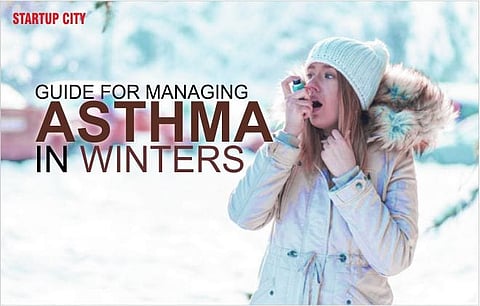

One of the most challenging physical health conditions, Asthma is a lung condition that can make your airways narrow, swell, and produce extra mucus, which causes breathing difficulties.
While some suffer from the condition for their entire lifetime, suffering from an asthma attack is a significant problem they usually face.
The condition with no cure available tends to showcase an increased number of attacks in winter according to some asthma patients.
While the challenges in winter are staying inside inhaling triggers and the cold weather outside causing flu, asthma patients have to be aware of the measures they can take to manage asthma in winter.
They tend to breathe the asthma triggers inside the house or at work. The triggers usually include mold, pet dander, dust mites, and even fires in the fireplace. On the other hand, when someone ventures out they breathe cold air that can also lead to an asthma attack.
The season of cold and flu can be particularly challenging for people who have asthma and but one may confuse both conditions and form a few myths about it over time. Here is how one can bust the common myths about flu and asthma and manage their condition better:
One cannot get a flu shot when he/she has asthma: There is no evidence found to this claim, on the other hand, one must have a flu shot especially if they are asthma patients as they are in much more need than an average person. Flu infection can trigger asthma attacks as the patients can have a severe course of influenza.
One won't have an issue due to the flu if they have well-managed asthma: It is believed that those who manage their asthma with medications have fewer chances to experience the symptoms of the flu, however, the flu can cause exacerbation to someone who has well-managed asthma. This can be due to inflammation that causes the inning lining of the airways to swell and mucus to be produced.
Allergens are the most common cause for increased asthma symptoms: Asthma is a complex condition that has to do with airway hyperactivity and a certain characteristic and appearance on pulmonary function tests. Allergens are anything that is consumed or inhaled that can cause allergic reactions, they are a big trigger but they are not the most common ones as the number one trigger is cold and flu.
More children with asthma experience flu than kids without it: Well, it is not true, children with or without asthma suffer from flu and cold, however, the fact that kids with asthma may experience symptoms that gets worse as they may keep the airways reactive.
Winters are tough for asthma patients, both kids, and adults, an action plan made with the doctors can benefit one to be prepared for the winters.
The plan will act as a guide to ensure that one puts their efforts to control the condition with information and instructions on knowing if the symptoms get worse, medications to take when one is doing well and when symptoms get worse, steps to take in an emergency, doctor's contact info for an emergency and controlling asthma triggers.
Triggers make the airways or the tubes in the lungs that carry air become tight and clogged with mucus resulting in an asthma attack. One should acknowledge the triggers that make their condition worse to manage asthma in winter.
Limiting time around pets like dogs and cats can help curb the allergy triggers along with using cover bedding like mite-proof covers on the mattress, box springs, and pillows.
Washing hands often, avoiding sharing food and drinks with people who are ill as well as be aware of the objects that can harbor germs, and keeping the nebulizers clean can be done as activities to guard the body against colds and viruses.
These preventive measures are a key part of what one can do to manage asthma in winter.
Now that the myth is cleared, getting an Aflu shot will be a good way to avoid catching the flu and also ensure that one is taking their medication on time. Asthma medications play a key role in controlling the condition and its symptoms.
Controller medications help avoid asthma attacks by keeping the airways less inflamed. Quick relief medications or rescue medications relax the muscles around the airway. The right medication allows one to live an active and normal life.
When it is cold outside in the winter, cold air can become a trigger for asthma attacks. In such a scenario, one should avoid exercising in the cold symptoms can increase symptoms such as coughing and wheezing even faster leading to cold-induced asthma.
One should avoid going outside to the park as the temperatures and the humidity in the gym are less likely to cause a problem.
With the information given above along with the myths and measures that one can take to avoid asthma attacks in winter, one should be able to avoid the risks of attacks and stay healthy in the cold weather.